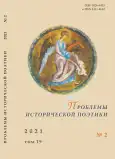Artistic theodicy in The Brothers Karamazov by F. M. Dostoevsky
- Autores: Stepchenkova V.N.1
-
Afiliações:
- Moscow State Regional University
- Edição: Volume 19, Nº 2 (2021)
- Páginas: 107-124
- Seção: Articles
- URL: https://bakhtiniada.ru/1026-9479/article/view/284343
- DOI: https://doi.org/10.15393/j9.art.2021.9242
- ID: 284343
Citar
Texto integral
Resumo
The aim of the research study is to explain the artistic theodicy of F. M. Dostoevsky. The justification of God before the world he created, in which evil forces are allowed to act, is one of the principal themes in the novel. In those scenes of the novel that raise the theme of innocuous suffering, Dostoevsky offers to comprehend the meaning of suffering. Dostoevsky sees it as not only as a result of the influence of an evil force, but also as a path to perfection for human beings and a way to experience communication with God. Dostoevsky shows that from a Christian spiritual perception of sorrows, one can find the strength to overcome them and see the highest sacred meaning in them. This conclusion is not based on the optimistic theodicy of Leibniz, but only reveals the goodness of God, who is capable of turning the evil, which entered the world along with the Fall, into an opportunity for a person to rise to a new spiritual level. The most important argument of theodicy is love: God’s love for man and man’s capacity to love, overcoming evil. Because of the lack of love, guided only by the “Euclidean mind,” Ivan returns his “entry ticket” to harmony. The logical conclusion of the research study states that Dostoevsky’s key to theodicy and the main value in the moral self-determination of man is the belief in the immortality of the soul and the all-goodness of the Creator.
Palavras-chave
Sobre autores
V. Stepchenkova
Moscow State Regional University
Autor responsável pela correspondência
Email: St_valentina007@mail.ru
ORCID ID: 0000-0001-5327-6316
Postgraduate Student of the Russian Classic Literature Department
Rússia, MoscowBibliografia
- Azarenko N. A. The Concept Suffering as the Main Representative of the Childhood Theme in the Works of F. M. Dostoevsky. In: Voprosy kognitivnoy lingvistiki [Issues of Cognitive Linguistics]. Tambov, 2010, no. 2, pp. 48–53. (In Russ.)
- Anikin D. A. The Confessions Style in the Age of Posmodernity. In: Izvestiya Saratovskogo universiteta. Novaya seriya. Seriya: Filosofiya. Psikhologiya. Pedagogika [Izvestiya of Saratov University. New Series. Series: Philosophy. Psychology. Pedagogy]. Saratov, 2008, no. 1, pp. 3–7. (In Russ.)
- Batalova T. P. The Poetics of the “Epilogue” in the Novel “The Brothers Karamazov” by F. M. Dostoevsky. In: Problemy istoricheskoy poetiki [The Problems of Historical Poetics], 2017, vol. 15, no. 3, рр. 94–108. Available at: https://poetica.pro/files/redaktor_pdf/1506097137.pdf (accessed on September 24, 2020). doi: 10.15393/j9.art.2017.4463 (In Russ.)
- Belknap R. L. Struktura «Brat’ev Karamazovykh» [The Structure of “The Brothers Karamazov”]. St. Petersburg, Akademicheskiy proekt Publ., 1977. 144 p. (In Russ.)
- Vaganova N. A. Leibniz’ Theodicy and “The Brothers Karamazov” by Fyodor Dostoevsky. In: Ezhegodnaya bogoslovskaya konferentsiya Pravoslavnogo Svyato-Tikhonovskogo gumanitarnogo universiteta [Annual Theological Conference of Saint Tikhon’s Orthodox University of Humanities]. Moscow, 2008, no. 18, рр. 193–200. (In Russ.)
- Vetlovskaya V. E. Roman F. M. Dostoevskogo «Brat’ya Karamazovy» [F. M. Dostoevsky’s Novel “The Brothers Karamazov”]. St. Petersburg, Pushkinskiy Dom Publ., 2007. 640 p. (In Russ.)
- Zakharov V. N. The Fantastic as a Category of Dostoevsky’s Poetics of the 1870s. In: Zhanr i kompozitsiya literaturnogo proizvedeniya [Genre and Composition of a Literary Work]. Petrozavodsk, Petrozavodsk State University Publ., 1981, pp. 41–54. (In Russ.)
- Iustin (Popovich), Reverend. Filosofiya i religiya F. M. Dostoevskogo [Philosophy and Religion of F. M. Dostoevsky]. Minsk, Izdatel’ D. V. Kharchenko Publ., 2007. 312 p. (In Russ.)
- Kantor V. K. Fyodor Dostoevsky, Vladimir Soloviev, Augustine. In: F. M. Dostoevskiy i kul’tura Serebryanogo veka: traditsii, traktovki, transformatsii [F. М. Dostoevsky and the Silver Age Culture: Traditions, Interpretations, Transformations]. Moscow, Vodoley Publ., 2013. 592 р. (In Russ.)
- Capilupi S. M. Dostoevsky and Christianity: New Research Findings. In: Vestnik Russkoy khristianskoy gumanitarnoy akademii [Review of the Russian Christian Academy for the Humanities]. St. Petersburg, 2017, vol. 18, issue 2, рр. 136–144. (In Russ.)
- Capilupi S. M. A Meeting Between “The Sinner” and “The Just” and the Theme of Conversion in “The Karamazov Brothers” by F. M. Dostoevsky. In: Vestnik Russkoy khristianskoy gumanitarnoy akademii [Review of the Russian Christian Academy for the Humanities]. St. Petersburg, 2019, vol. 20, issue 4, рр. 252–264. (In Russ.)
- Kibal’nik S. A. About the Philosophical Subtext of the Formula “If There Is no God…” in the Works of Dostoevsky. In: Russkaya literatura, 2012, no. 3, pp. 152–163. (In Russ.)
- Kiseleva I. A. “The Prophet” by A. S. Pushkin (1826) and “The Prophet” by M. Yu. Lermontov (1841): A Comparative Semantics of the Motifs. In: Problemy istoricheskoy poetiki [The Problems of Historical Poetics], 2020, vol. 18, no. 1, pp. 111–129. Available at: https://poetica.pro/files/redaktor_pdf/1582890894. pdf (accessed on September 24, 2020). doi: 10.15393/j9.art.2020.6762 (In Russ.)
- Losskiy N. O. Dostoevskiy i ego khristianskoe miroponimanie [Dostoevsky and His Christian Understanding of the World]. New York, Izdatel’stvo imeni Chekhova Publ., 1953. 406 p. (In Russ.)
- Skomorokhov A. V. The Problem of Explaining the Evil: From Kant to Dostoevsky. In: Filosofiya i obshchestvo [Philosophy and Society], 2019, no. 4 (93), pp. 123–133. (In Russ.)
- Slovar’ yazyka Dostoevskogo. Leksicheskiy stroy idiolekta [Dostoevsky’s Language Dictionary: The Lexical Order of Idiolect]. Moscow, Institute of the Russian Language of the Russian Academy of Sciences Publ., 2007, issue 3. 592 p. (In Russ.)
- Tikhomirov B. N. About Dostoevsky’s “Christology”. In: Dostoevskiy. Materialy i issledovaniya [Dostoevsky. Materials and Researches]. St. Petersburg, Nauka Publ., 1994, vol. 11, рр. 102–121. (In Russ.)
- Shestov L. Kirgegard i ekzistentsial’naya filosofiya (glas vopiyushchego v pustyne) [Kierkegaard and Existential Philosophy (Voice Crying in the Desert)]. Moscow, Progress Publ., Gnozis Publ., 1992. 304 р. (In Russ.)
- Schmid V. Proza kak poeziya. Pushkin, Dostoevskiy, Chekhov, avangard [Prose as Poetry. Pushkin, Dostoevsky, Chekhov, Avant-garde]. St. Petersburg, Inapress Publ., 1998. 352 p. (In Russ.)
Arquivos suplementares










